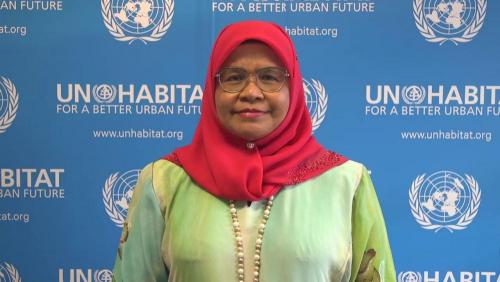
https://unhabitat.org/opinion-piece-by-executive-director-on-how-cities-...
By Maimunah Mohd Sharif
Cities and towns have been on the front line of the global response to COVID-19 and their role will remain critical in protecting people, curbing the further spread of the disease and starting the process of recovery and resilience building
Local governments and mayors are key players in protecting their residents, from promoting health and well-being to providing health services which are accessible to all, including the most vulnerable.
At the same time, they are the catalysts who can promote the planning and transformation of cities that can lead to healthier populations, building resilience to future public health crises and developing emergency preparedness systems to act quickly.
The pandemic and the global response have highlighted the inequalities that exist in urban settings. Lack of access to basic services such as healthcare, education, public transport and clean water and sanitation, along with overcrowded homes and lack of regular employment, clearly make some communities—such as people in informal settlements or slums—much more vulnerable during pandemics.
Equitable access to health supplies and resources are essential, as is supporting the poor and other vulnerable groups with free or low-cost access to PPE, testing and treatment. City planners need to work through a whole-of-city approach, including liaising with health officials to re-organize urban areas and provide suitable triage arrangements for quarantine.
Local leadership needs to ensure all sections of society are involved in discussions on preventing COVID-19, including the marginalized and those living in informal settlements. Once vaccines are available, full participation of all community groups will be essential in planning effective and equitable distribution.
If proper protective measures are followed for all, urban residents can be safeguarded against COVID-19 and the economy can more easily and more quickly open up. Essential services for vulnerable populations, such as public transport, can be maintained safely, through stricter hygiene measures and reduced ridership protocols.
Public health emergencies and the management of endemic disease require a multi-sectoral approach integrating policies and plans across health, urban planning, water and sanitation, environmental protection and other relevant areas. Although led by ministries of health, multi-sectoral action should be planned and implemented at city level.
This is explored further in the upcoming UN-Habitat Report on ‘Cities and Pandemics – towards a more just, green and healthy future’ which emphasizes the importance of integrating health into urban planning to build resilience against pandemics by improving urban and physical health.
The report illustrates how the shape of cities can be instrumental in improving health and wellness by providing access to healthy food, clean air, water and sanitation and through infrastructure that supports physical activity.
It also explores the concept of mixed-use, walkable ‘15-minute neighbourhoods’ providing equitable access to services including healthcare facilities, public transport and ample public space. These compact neighbourhoods improve public health and the environment by encouraging exercise including walking and cycling, reduce car dependency and at the same time encourage local production and consumption to boost local economic development and improve social cohesion.
While it should not take a public health emergency to spur such action, lasting improvements in people’s health and well-being would leave the entire post-pandemic world better off.
Earlier this year UN-Habitat and the World Health Organization launched a joint sourcebook Integrating health in urban and territorial planning. This emphasized that everyone has a part to play in ensuring health of populations including local communities and doctors, health workers and public health authorities, engineers and architects.
Local leaders have now become the health guardians of their cities and communities and UN-Habitat stands ready to support them in COVID-19 prevention and protection as well as planning for healthier urban environments.










Add new comment